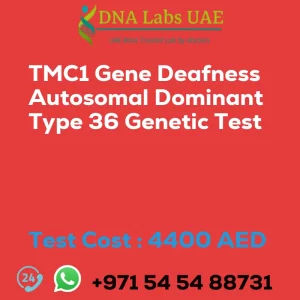DIABLO Gene Deafness Autosomal Dominant Type 64 Genetic Test
Welcome to DNA Labs UAE, where we offer the DIABLO Gene Deafness Autosomal Dominant Type 64 Genetic Test. This test is designed to diagnose and provide valuable information about the genetic condition that causes hearing loss.
Test Details
The DIABLO gene deafness, autosomal dominant type 64 is a genetic condition that causes hearing loss. It is inherited in an autosomal dominant pattern, meaning that an affected individual has a 50% chance of passing the condition on to each of their children.
The NGS (Next Generation Sequencing) Genetic Test is a type of genetic test that uses advanced sequencing technology to analyze a person’s DNA. This test can identify specific genetic variants, including mutations in the DIABLO gene, which may be associated with deafness.
The NGS Genetic Test for DIABLO gene deafness, autosomal dominant type 64 involves obtaining a sample of DNA, usually through a blood sample or a cheek swab. The DNA is then sequenced, and the results are analyzed to determine if any mutations or variants are present in the DIABLO gene.
This genetic test can be used for diagnostic purposes, helping to confirm a diagnosis of DIABLO gene deafness, autosomal dominant type 64 in individuals with hearing loss. It can also be used for carrier testing, to determine if an individual carries a mutation in the DIABLO gene and has a risk of passing it on to their children.
It’s important to note that a positive genetic test result does not necessarily mean that an individual will develop hearing loss. Genetic testing can provide valuable information for individuals and their families, helping them make informed decisions about their healthcare and reproductive choices. Genetic counseling is often recommended before and after genetic testing to discuss the implications of the results and provide support.
Test Name
DIABLO Gene Deafness Autosomal Dominant Type 64 Genetic Test
Components
- Price: 4400.0 AED
Sample Condition
Blood or Extracted DNA or One drop Blood on FTA Card
Report Delivery
3 to 4 Weeks
Method
NGS Technology
Test Type
Ear Nose Throat Disorders
Doctor
ENT Doctor
Test Department
Genetics
Pre Test Information
Clinical History of Patient who is going for CATSPER2 Gene Deafness and male infertility, CATSPER2 related NGS Genetic DNA Test. A Genetic Counselling session to draw a pedigree chart of family members affected with CATSPER2 Gene Deafness and male infertility, CATSPER2 related NGS Genetic DNA Test gene CATSPER6.
| Test Name | DIABLO Gene Deafness autosomal dominant type 64 Genetic Test |
|---|---|
| Components | |
| Price | 4400.0 AED |
| Sample Condition | Blood or Extracted DNA or One drop Blood on FTA Card |
| Report Delivery | 3 to 4 Weeks |
| Method | NGS Technology |
| Test type | Ear Nose Throat Disorders |
| Doctor | ENT Doctor |
| Test Department: | Genetics |
| Pre Test Information | Clinical History of Patient who is going for CATSPER2 Gene Deafness and male infertility, CATSPER2 related NGS Genetic DNA Test. A Genetic Counselling session to draw a pedigree chart of family members affected with CATSPER2 Gene Deafness and male infertility, CATSPER2 related NGS Genetic DNA Test gene CATSPER6 |
| Test Details |
DIABLO gene deafness, autosomal dominant type 64 is a genetic condition that causes hearing loss. It is inherited in an autosomal dominant pattern, which means that an affected individual has a 50% chance of passing the condition on to each of their children. NGS (Next Generation Sequencing) Genetic Test is a type of genetic test that uses advanced sequencing technology to analyze a person’s DNA. This test can identify specific genetic variants, including mutations in the DIABLO gene, which may be associated with deafness. The NGS Genetic Test for DIABLO gene deafness, autosomal dominant type 64 involves obtaining a sample of DNA, usually through a blood sample or a cheek swab. The DNA is then sequenced, and the results are analyzed to determine if any mutations or variants are present in the DIABLO gene. This genetic test can be used for diagnostic purposes, helping to confirm a diagnosis of DIABLO gene deafness, autosomal dominant type 64 in individuals with hearing loss. It can also be used for carrier testing, to determine if an individual carries a mutation in the DIABLO gene and has a risk of passing it on to their children. It’s important to note that a positive genetic test result does not necessarily mean that an individual will develop hearing loss. Genetic testing can provide valuable information for individuals and their families, helping them make informed decisions about their healthcare and reproductive choices. Genetic counseling is often recommended before and after genetic testing to discuss the implications of the results and provide support. |







